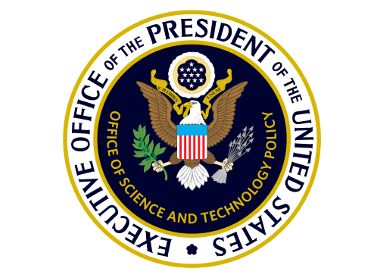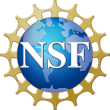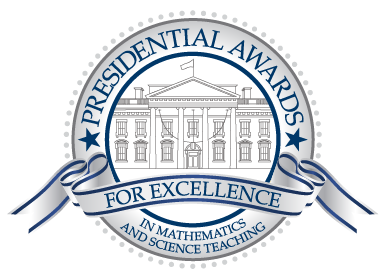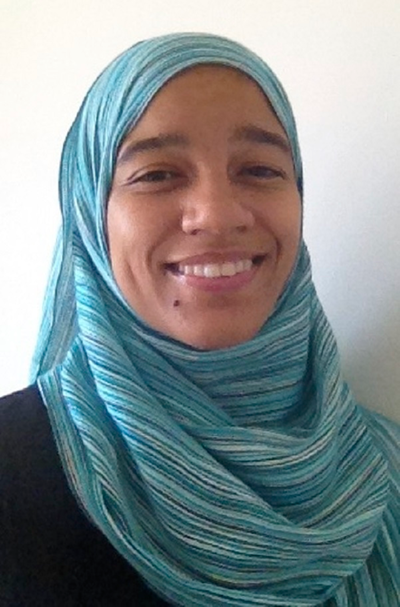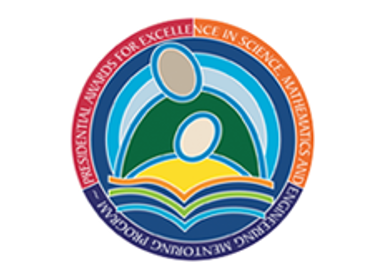 About the Awards
About the Awards
What are the Presidential Awards for Excellence in Mathematics and Science Teaching?
The Presidential Awards for Excellence in Mathematics and Science Teaching (PAEMST) are the highest honors bestowed by the United States government specifically for K-12 science, technology, engineering, and mathematics teaching. The Awards were established by Congress in 1983. The President may recognize a total of 110 exemplary teachers each year.
Awards are given to science, technology, engineering, and mathematics teachers from each of the 50 states, the Department of Defense Education Activity schools, and the U.S. Jurisdictions of the District of Columbia, the Commonwealth of Puerto Rico, American Samoa, Guam, the Commonwealth of the Northern Mariana Islands, and the U.S. Virgin Islands.
The award recognizes those teachers that have both deep content knowledge of the subjects they teach and the ability to motivate and enable students to be successful in those areas. Since the program's inception, more than 5,200 teachers have been recognized for their contributions in the classroom and to their profession.
Awardees reflect the expertise and dedication of the Nation's teaching corps, and they demonstrate the positive impact of excellent teachers on student achievement. The National Science Foundation administers PAEMST on behalf of The White House Office of Science and Technology Policy.
Why Apply?
Recipients of the award receive the following:
- A certificate signed by the President of the United States.
- An all-expenses paid trip to a recognition event, which includes an award ceremony.
- A $10,000 award from the National Science Foundation.
- An opportunity to build lasting partnerships with colleagues across the nation.
Eligibility
Applicants must:
- teach science, technology, engineering, or mathematics as part of their contracted teaching responsibilities at the K-6 grade level in a public (including charter) or private school;
- hold at least a bachelor's degree from an accredited institution;
- be a full-time employee of their school or school district as determined by state and district policies, with responsibilities for teaching students no less than 50% of the school's allotted instructional time;
- have at least five years of full-time employment as a K-12 teacher prior to the 2023-2024 academic school year, with science, technology, engineering, or mathematics teaching duties;
- teach in one of the 50 states, the Department of Defense Education Activity schools, or the U.S. Jurisdictions of the District of Columbia, the Commonwealth of Puerto Rico, American Samoa, Guam, the Commonwealth of the Northern Mariana Islands, and the U.S. Virgin Islands;
- be a U.S. citizen or permanent resident; and
- not have received the PAEMST award at the national level in any prior competition or category.
The Awards Process: Overview
Nomination
Anyone—principals, teachers, parents, students, or members of the general public—may nominate exceptional individuals who teach science, technology, engineering, and mathematics in grades K-6 for this award year. To submit a nomination, the following information is required:
- Teacher's name
- Email address
- School contact information
Nominations may be submitted for more than one teacher. Teachers may also initiate the application process themselves.
Once a teacher is nominated or initiates the application process, the teacher will receive an email invitation to continue the application process. The invitation will include login information for accessing the online application system.
Sign up to be notified when nominations open or contact info@paemst.org if you have any questions regarding the PAEMST nomination process.
Application
The PAEMST application consists of three sections: Administrative, Narrative, and Video. All application components will be completed in the PAEMST application portal. The application is designed to allow the applicant to provide evidence of deep content knowledge, exemplary pedagogical skills, student assessment expertise, reflective teaching, and leadership that results in improved student learning. After eligibility is confirmed and technical specifications are met, each application will be evaluated using the following five Dimensions of Outstanding Teaching:
- Dimension One: Mastery of content appropriate for the grade level taught.
- Dimension Two: Use of effective instructional approaches that are appropriate for the students in the classroom and that support student learning.
- Dimension Three: Effective use of student assessments to evaluate, monitor, and improve student learning.
- Dimension Four: Reflective practice and life-long learning to improve teaching and student learning.
- Dimension Five: Opportunity, access, and leadership in education inside and outside of the classroom.
The PAEMST program encourages applications that provide evidence of STEM convergence education. STEM convergence education is driven by compelling, complex real-world problems which engages learners in working across multiple disciplines to create innovative solutions. This approach to STEM teaching engages students at the convergence of STEM disciplines through activities that require initiative and creativity, such as: project-based learning, problem-based learning, and invention challenges, modeling, integrating mathematics and computational thinking into science, analyzing and interpreting data, and designing solutions. Interdisciplinary STEM teaching is the pedagogical approach by which students learn the interconnectedness of the disciplines of science, technology, engineering, and mathematics.
The 2023-2024 application packet will be posted to the website shortly.
Login to the application systemSelection
At the state and jurisdiction level, coordinators convene selection committees, which include prominent mathematicians, scientists, mathematics/science education researchers, district-level personnel, and classroom teachers. These committees select a total of six finalists (three from each award category) for recognition at the state and jurisdiction level. States and jurisdictions are strongly encouraged to forward finalists in each of the STEM areas.
State and jurisdiction selection committees review applications using the criteria and scoring information presented in this application packet.
Application Addendum
State and jurisdiction finalists will have the opportunity to respond to state and jurisdiction level review feedback through an optional addendum to their original application. State and jurisdiction finalists can work with a mentor on this addendum, which is limited to five pages: three pages to respond to state or jurisdiction feedback on the Five Dimensions of Outstanding Teaching and two pages to provide additional supplemental materials. The optional addendum must be uploaded to the PAEMST portal between March 23, 2024 and March 31, 2024. Finalists will not be able to make any edits to the original application but will be able to add new narrative language for each Dimension. The additional supplemental materials can include material not submitted as part of the original application but must not include activities completed after the application due date of February 6, 2024.
At the national level, NSF convenes a national selection committee composed of prominent mathematicians, scientists, mathematics/science education researchers, district-level personnel, and classroom teachers. The national committee reviews state and jurisdiction finalists’ applications using the criteria and scoring information presented in this application packet. NSF then recommends two finalists (ideally one from each award category) per state and jurisdiction to the White House OSTP. All finalists are subject to a Federal Bureau of Investigation background check and good standing confirmation from their principal.
Recognition
Each Presidential Awardee receives a certificate signed by the President of the United States, a $10,000 award from NSF, and an all-expenses paid trip for an award ceremony. In addition, awardees join a national cohort of award-winning teachers, providing opportunities to impact teaching on a state and national scale. The recognition events may include professional development opportunities and discussions with policy makers on how to improve science, technology, engineering, and mathematics education.
Learn more about the event, and current awardees, on the PAEMST Recognition Program Web site.